Your Ultimate Source for All‑Things Vegan
Get the world’s #1 plant‑based magazine
Aamulya
by Kat Smith
November 5, 2022
Wine and cheese is a famous pairing that sommeliers, chefs, and diners have perfected over centuries. If you’re dairy-free or open to expanding your culinary horizons, do the same rules apply to pairing wine with vegan cheese? The answer is: yes, they do. If you learn the ins and outs of wine and cheese pairings, you can create some beautiful plant-based culinary experiences.
First, let’s talk about cheese. Why does it pair so well with wine? “The acids and tannins in wine are subdued by the fat and creamy texture of cheese, which creates a chemical reaction and physical sensation on your palate. In exactly the same way that tannic, strong tea is mellowed by a touch of milk or milk substitute,” Frances Gonzalez, owner and founder of Vegan Wines, tells VegNews. For example, cheese helps decrease the astringency of red wine while bringing out its fruitiness.
When pairing things the vegan way, you’ll want to choose dairy-free versions of the types of cheeses you’d typically serve with wine. Think classic wine pairings such as pinot noir and gruyère, champagne and brie, and cabernet sauvignon with aged cheddar.
“Above any flavor combination or contrast, you always want to make sure that the intensity of flavors is about even in the cheese and the wine, or you will lose subtlety for whichever element is more delicate,” explains Gonzalez.
Thankfully, there’s a growing movement of artisan vegan cheese makers who follow the traditional methods. Making cheese the traditional way requires two key components: milk and bacterial cultures. As traditional cheese ferments, its texture becomes drier and its flavor becomes more intense. This is because the bacterial cultures break the lactose down into lactic acid while the proteins become amino acid compounds that give aged cheese its flavor.
Instead of dairy, vegan cheese mongers grind nuts or seeds into a paste, combine it with bacteria, and let it age. By recreating the specific circumstances that turn milk and bacteria into stinky cheese, they can transform plant-based ingredients into something that would fool most. Cashews—favored by brands such as Miyoko’s Creamery, Nuts for Cheese, and The Uncreamery—are the popular nut for the job, due to their high-fat content.
Bad news: not all wine is vegan. Good news: but, a lot of it is. Some winemakers use isinglass (the dried swim bladder of fish) to filter out sediments. This process is called “fining,” and it gives the wine a crisper flavor and clearer appearance, but it’s not necessary to use animal byproducts. More winemakers are adopting animal-free fining practices, which include the use of ceramic filters or bentonite clay. Some skip this clarification process altogether.
When looking for wine, check for “vegan” on the label. If there’s no indication of how the wine was filtered, check out our guide to vegan-friendly wines or search for the company on Barnivore.com, an extensive database of vegan libations.
The same rules that you would apply to pairing wine with dairy-based cheese apply to imbibing your favorite vino with artisan vegan cheese.
Throughout this guide, we reference types of vegan cheese, such as mozzarella or camembert, but may not recommend a brand for every suggestion. Check out our vegan cheese guide for a more comprehensive list of which brands make which varieties.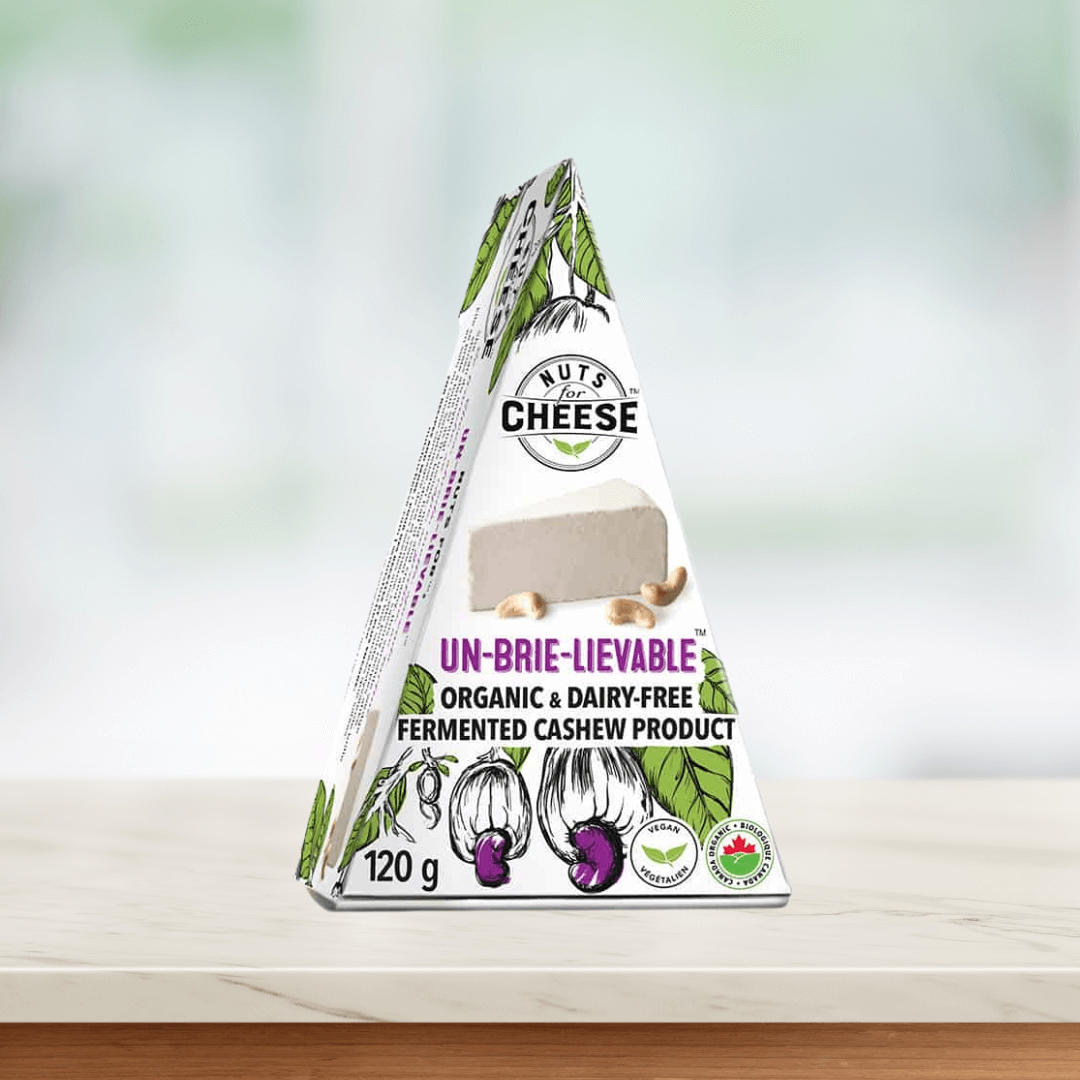 Nuts for Cheese
Nuts for Cheese
Just like cheese becomes bolder in flavor as it ages, the wine undergoes a transformation, becoming heavier and bolder. Reds become more earthy in color while clear whites take on hues of straw. Young wines, meanwhile, tend to have notes of fruit, florals, citrus, herbs, and spices, and they go well with creamy plant-based cheeses.
Heavy, tannic reds go well with old, dry vegan cheeses that are rich in flavor. Try cabernet sauvignon with vegan brie or sharp, aged cheddar. Or, pair chardonnay with vegan camembert or gruyère.
Sparkling wines, dry rosés, light red wines, and crisp white wines will taste good with vegan mozzarella or chevre. These are dairy-free versions of fresh cheeses—cheese made from fresh curds that have not been aged. The flavor ranges from mild to tangy and the texture can be anywhere from spreadable to crumbly.
Pairings: Bokisch Andrus Island Albariño 2020 and Cultured Kindness Cashew Chevre, Luca Di Tomaso Montefalco Sagrantino DOCG 2016 and Nuts for Cheese Un-Brie-Lievable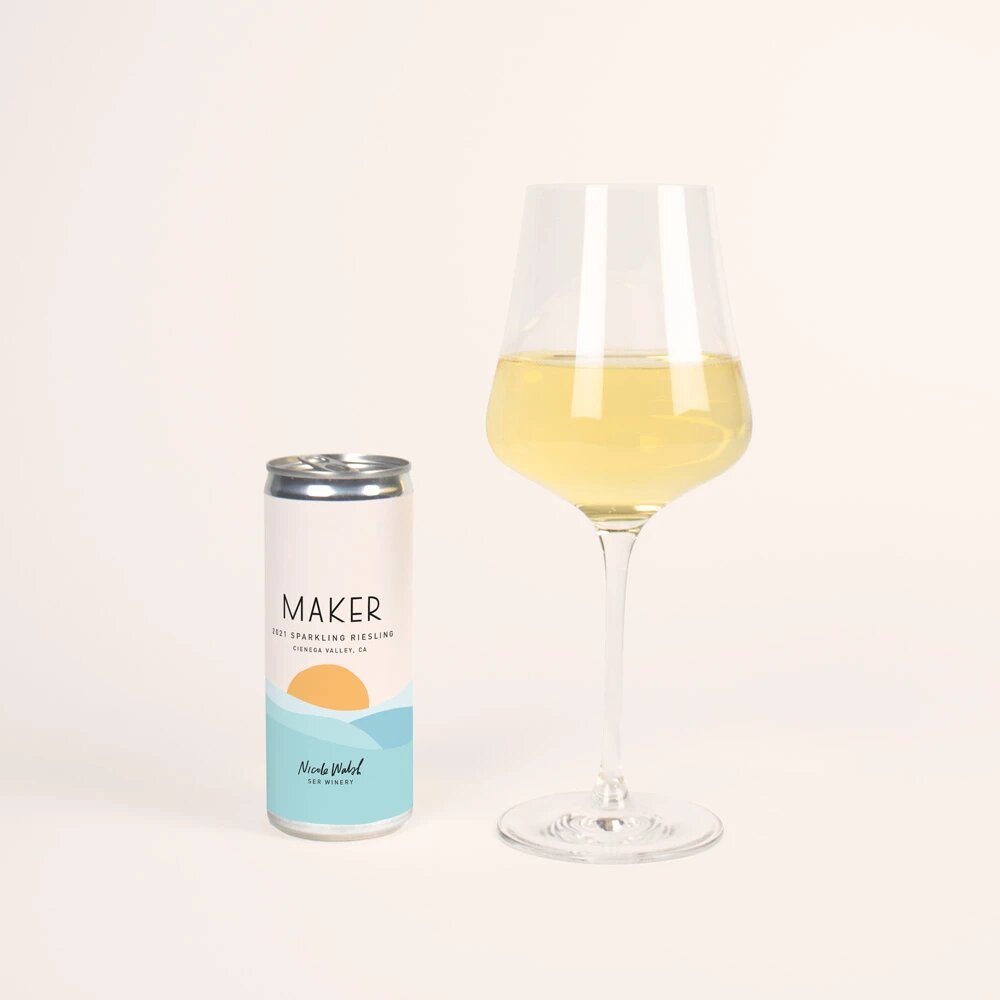 Maker
Maker
While it’s natural to combine cheeses of similar ages, this pairing is all about contrast. Break out sweet wines if you’re serving pungent, washed-rind, blue-veined vegan cheeses, including gorgonzola and blue cheese. The sugars in the wine balance the funk while the cheese prevents the sweetness of the wine from overpowering your palate. Choose dessert wines such as Moscato d’Asti or riesling, or reach for a sweet red wine, like zinfandel or port.
Pairing: Michael Klouda Hatterle Zinfandel 2016 and Virgin Cheese Organic Artisan Bleu, Maker Wine Dry Dry Sparkling Riesling and SriMu Imagine
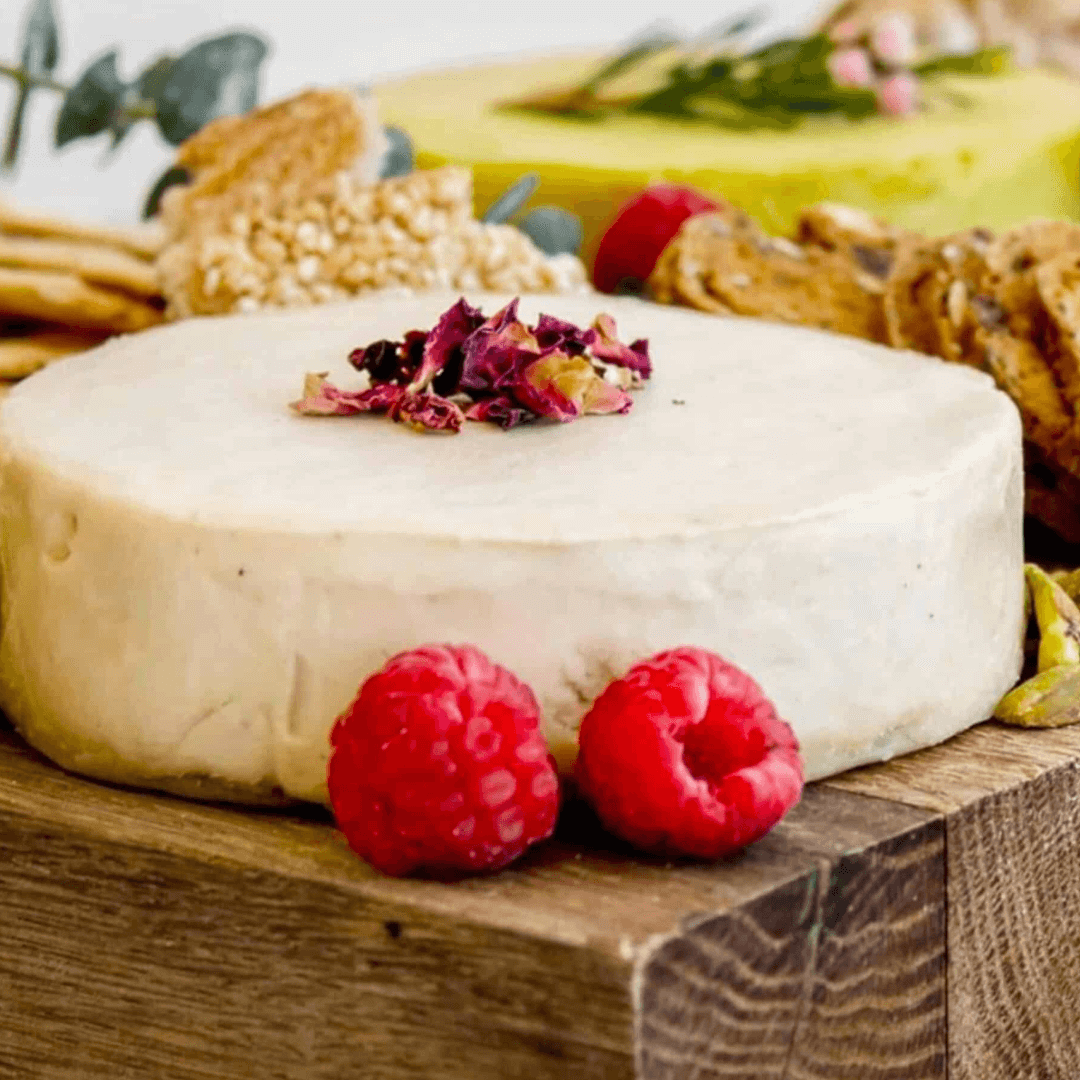 SriMu
SriMu
Sparkling wine is appropriate for all occasions, with its effervescent bubbles that dance on your palate, a typically high acidity, and flavors that range from very dry (extra brut) to noticeably sweet (demi-sec). Though there are many types of sparkling wine, the three most popular are champagne, prosecco, and Cava, while sparkling rosé has grown a bigger fan following in recent years.
The bubbles offer a palate-cleansing effect after the fat from a bite of a rich, creamy, or funky vegan cheese such as brie, muenster, camembert, or mozzarella coats your mouth. Hard, nutty, aged nut cheeses will work as well.
Pairings: 2019 Tarantas Sparkling White and Miyoko’s Creamery Organic Cashew Mozzarella, Surely Non-Alcoholic Sparkling Rosé and SriMu Elder-Brie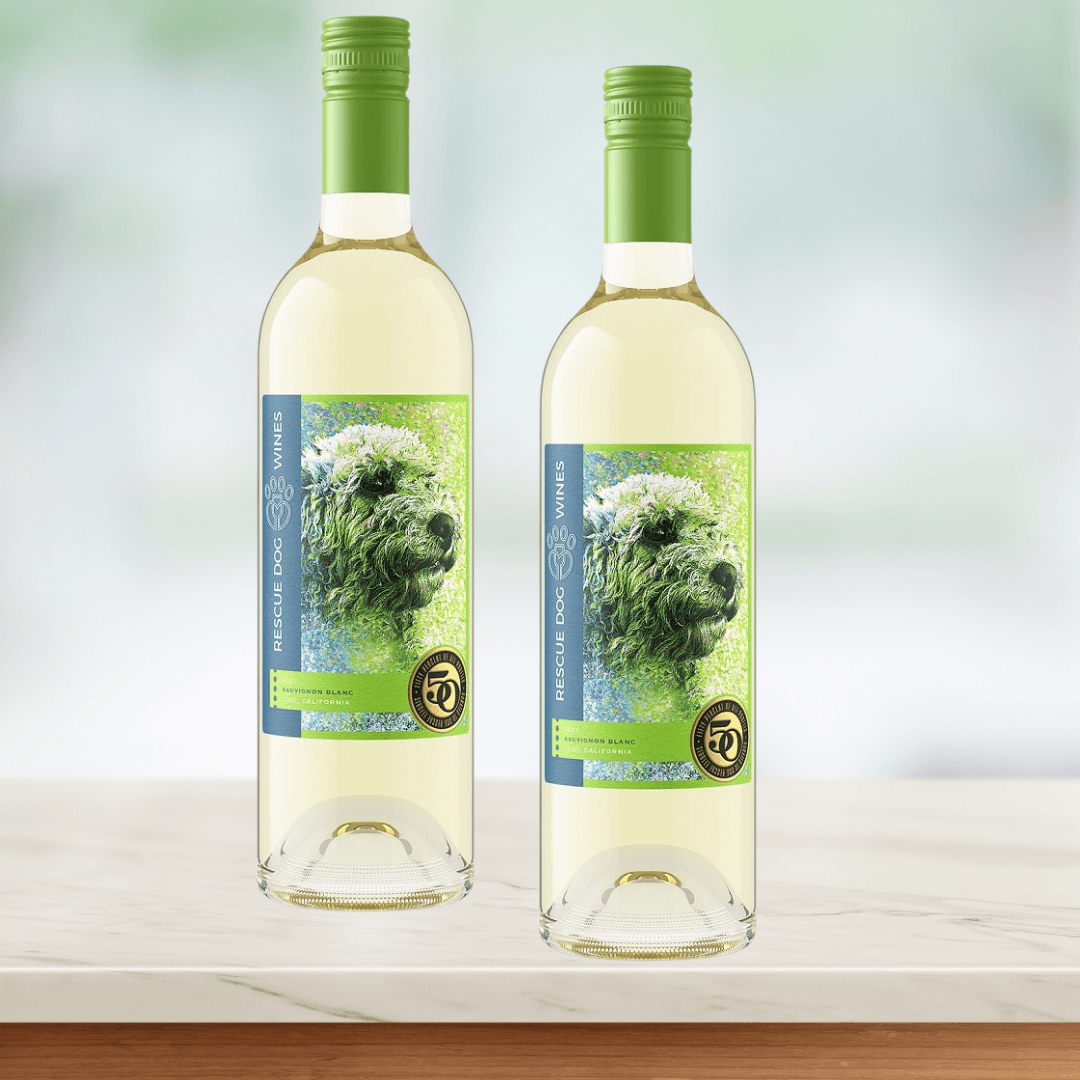 Rescue Dog Wines
Rescue Dog Wines
It’s said that what grows together goes together. This nugget of wisdom applies to cooking as well as pairing wine with cheese. Summer produce like zucchini, eggplant, tomatoes, and basil pair harmoniously together. Similarly, wine and cheese that come from the same region are typically a good match.
Because the artisan vegan cheese market is still growing, don’t worry if you can’t find a legitimate plant-based version of Époisses de Bourgogne to go with your Burgundy wine. An approximation works just fine. So, try sauvignon blanc with vegan chevre or have a bottle of prosecco ready to go with a Caprese salad featuring cashew mozzarella.
Pairings: Rescue Dog Wines Sauvignon Blanc and Spero Foods The Goat, Tiamo Organic Prosecco and Catalyst Creamery Mozzarella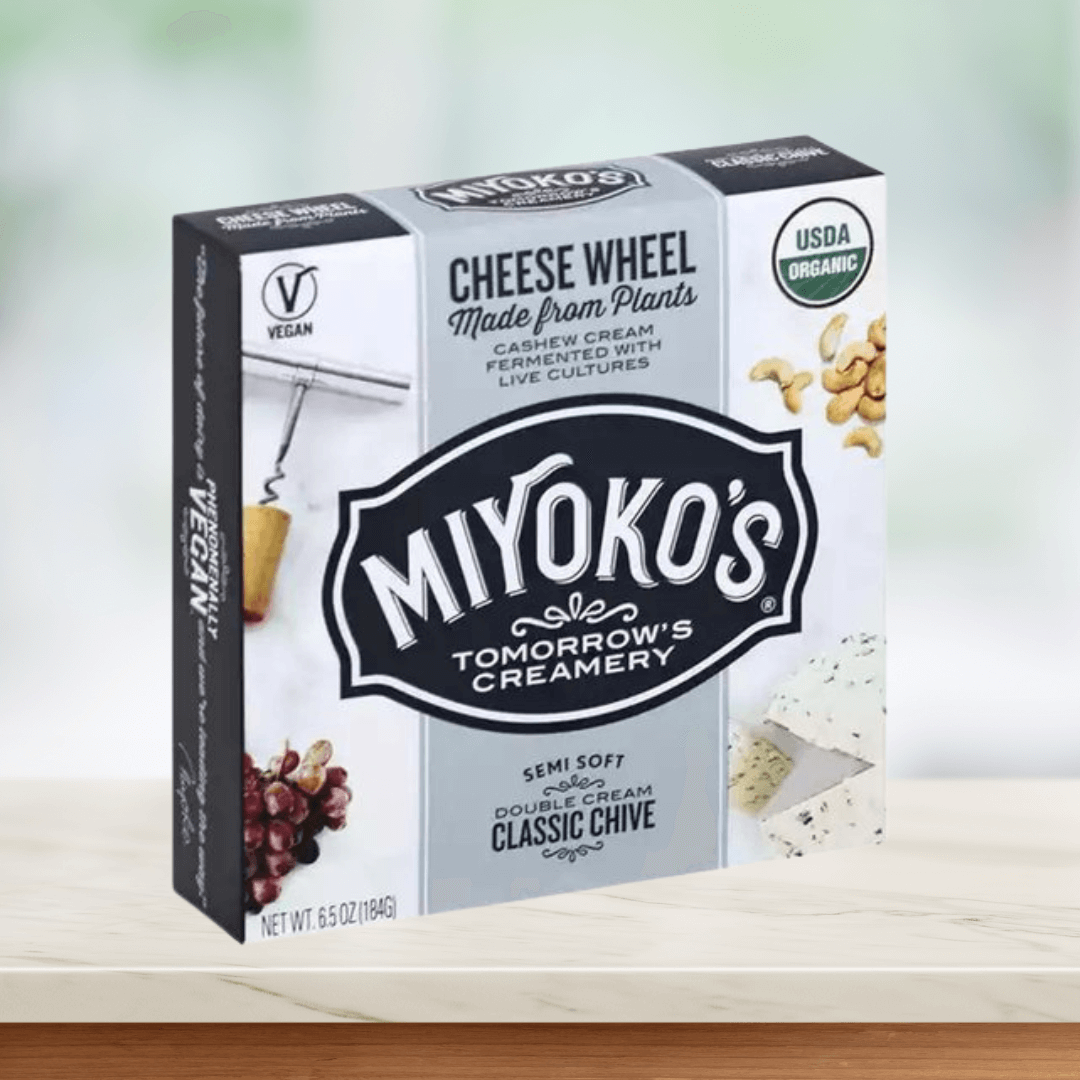 Miyoko’s Creamery
Miyoko’s Creamery
If you plan on serving an assortment of vegan cheeses and you want to simplify choosing the wine, you can rarely do wrong with something bubbly, like champagne. Though, any sparkling wine, from dry to sweet, will work with a plant-based cheese platter.
“I would lean toward a mild cheese with herbal flavors, something that will play differently with each wine that you offer and will highlight individual characteristics,” says Gonzalez.
On the other hand, sometimes you may have multiple wines and fewer cheeses. Here, you’ll want a firm, cashew-based cheese that strikes the right balance between fatty and dry. Cheese wheels by brands such as Miyoko’s Creamery or Treeline would do well here.
In addition to this, you might also want to consider serving your pairing alongside crackers, seasonal fruit, nuts, and dark chocolate.
Pairings: Cattier Brut Icône Champagne N.V. and Miyoko’s Classic Chive, Mujer Andina Levita Rosé Syrah and Treeline Soft French-Style Cheese
Kat Smith is a Queens, NY-based freelance writer and editor who loves cooking and discovering local vegan hidden gems.
The Holiday Food Issue is here! Here’s how to get it FREE.
Get the new issue
The Holiday Food Issue is here! Here’s how to get it FREE.
Get the new issue
Never miss out on breaking stories, recipes, and vegan deals
All-things vegan,
in your mailbox and inbox
Only $25
by VegNews Editors
by Tanya Flink
by Tanya Flink
by Tanya Flink
by Anna Starostinetskaya
by Marla Rose
Get the world’s #1 plant
Copyright © 2022 Fresh Healthy Media, LLC